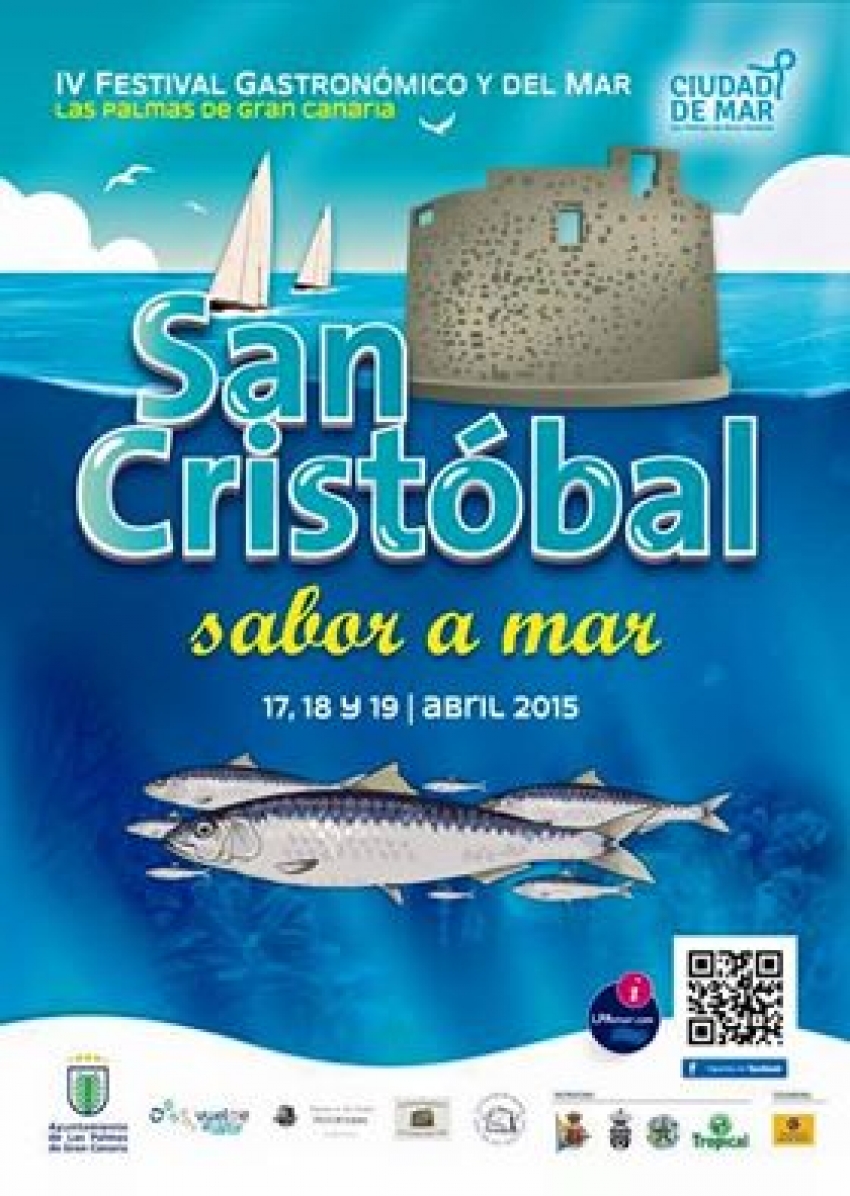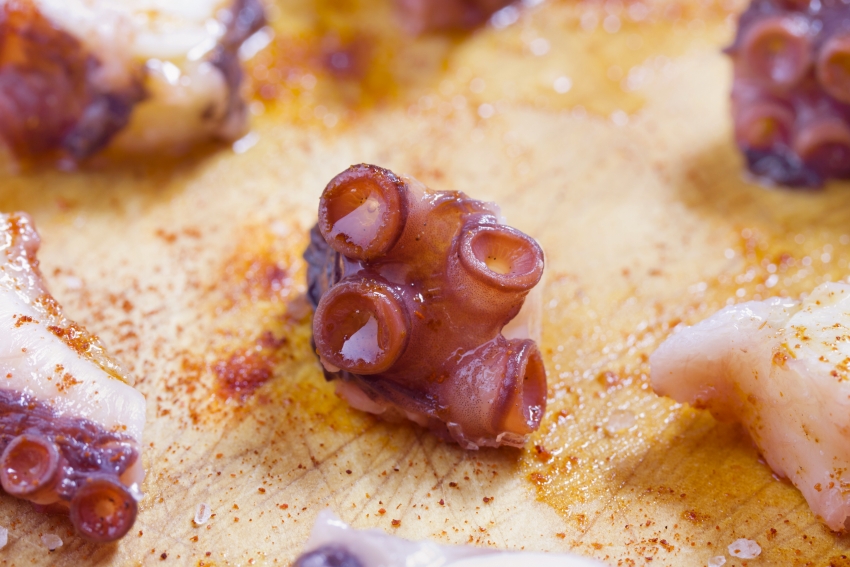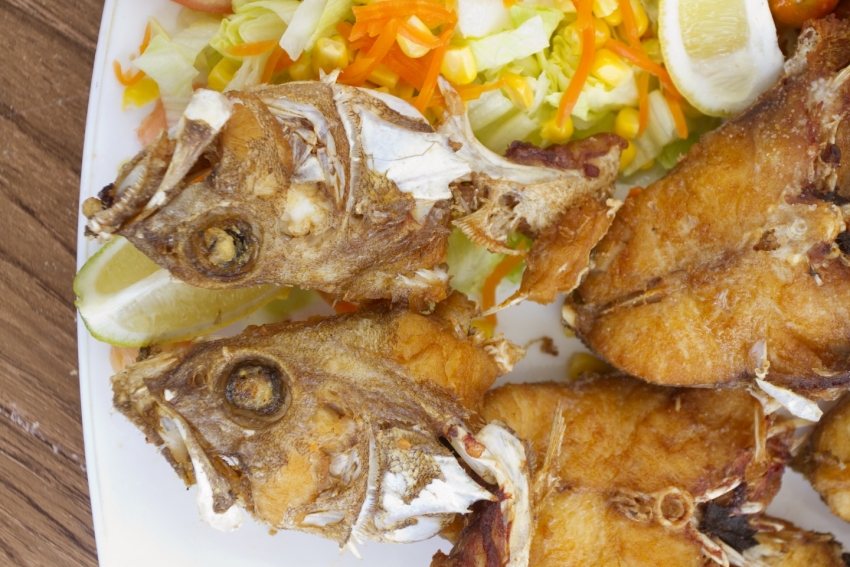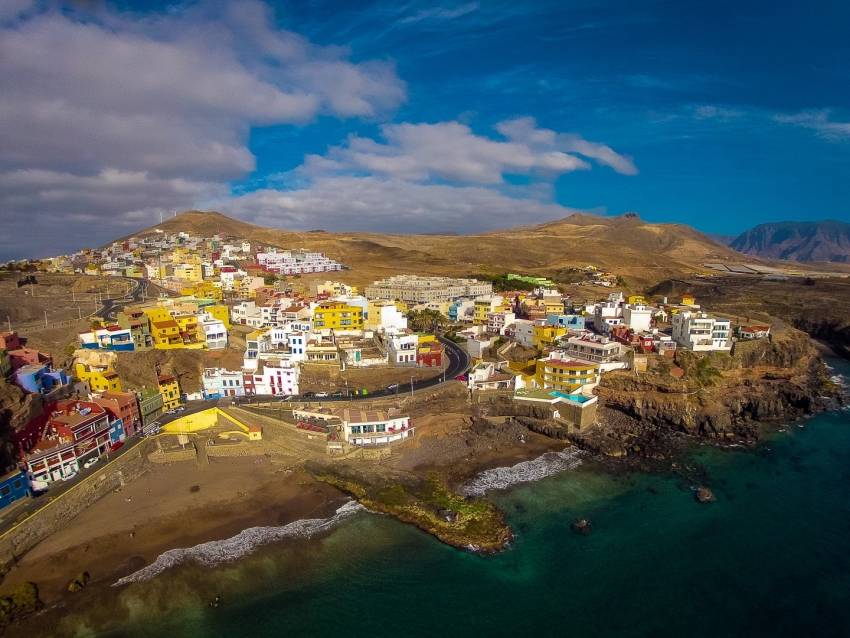Sardine Feast in San Cristobal Village Coming Up
For a sardine and seafood feast, head to San Cristobal village in north Gran Canaria on the weekend of April 18-19 for the Sabor a Mar festival.
Gran Canaria Fish & Seafood Glossary
The best Canarian seafood often comes in restaurants with Spanish menus so here's a handy guide to the most common types of fish, seafood and dishes in Gran Canaria.
Choosing Fresh Fish & Seafood In Gran Canaria
Top Six Scary Gran Canaria Seafood Dishes
Canarian food is famous for its simple, tasty seafood like fried squid rings, delicious prawns and fish stew. However, delve a bit deeper into the local cuisine and some more exotic ocean ingredients and seafood dishes pop up.
Alex Says: 25 years ago I remember watching old women in Lanzarote, wearing huge hats and head scarves, munch their way through a whole bucket of live sea urchins or erizos de mar. The cracked each one open and sucked out the fresh roe, before baiting their fish traps with the shells. The fresh roe is soft and a bit slimy, but tastes fresh and slightly fishy. In Japan, it is highly prized for top quality sushi.
Live Sea Urchins
Sea urchins have become such a problem in parts of the Canaries that the government is trying to get Canarians to eat them more often. The roe, cooked down into a sauce, tastes intensely of the sea. Trouble is, you need to collect a lot of spiny urchins to make a plate of pasta! Each one gives you half a teaspoon of eggs.
Grilled Limpets
Another local speciality is grilled limpets or lapas, served with green mojo sauce (made from garlic, fresh coriander, chilli, vinegar and oil). Limpets are hard to collect because they live on rocks in rough areas and clamp down if you try and dislodge them. The best way to get them is to sneak up and side swipe them with a rock or an iron bar. Cooking limpets is easy as they come in their own little pot: Just add a dash of lemon juice and a teaspoon of green mojo to each upturned limpet, and put them under the grill until the meat comes away from the shells. Limpets are tasty but a little bit chewy, especially if overdone.
Harvesting mussels and limpets is currently restricted in the Canaries, and especially on Fuerteventura, as over-collection was damaging the ecosystem. The limpets you find in small local bars are almost all imported. They still taste the same, and the freezing even makes them slightly tenderer!
Fried Moray Eel
Moray eels are fatty and full of bones, with hardly any meat at all. That doesn't stop Canarians from chopping them up and deep frying the bits until they go crispy. Then they chew up the crisped eel (morena frita) and spit out the bones. Moray eel is very satisfying because it is greasy and tasty, but most people are put off by the bones. Personally, I prefer my moray eels live and wriggling about! They get up to six feet long and make the islands a more attractive Scuba destination.
Octopus Old Clothes
Octopus old clothes (ropa vieja de pulpo) is a stew made from chickpeas, onions, tomatoes and octopus. It is called old clothes stew or "ropa vieja" because legend states that it was first made by a man so poor that he boiled his own clothes. When he took the top of his pot, he found this delicious dish inside instead. When you sit down to a dish of octopus ropa vieja, try not to picture the naked man who first ate it!
Poached Parrotfish
Poached parrotfish (vieja jareada) is an iconic Canarian dish that never gets onto tourist menus because the Canarians keep all the parrotfish to themselves. They are beautiful, multi-coloured animals, with big beaky teeth, that live in shoals and eat crabs and urchins. Their meat is soft and flaky and falls apart unless cooked with care. Viejas are poached whole with onion, peppers and laurel leaves and served with the skin unbroken.
Viejas are traditionally caught from small boats using a glass-bottomed box or "mirafondos", and a cane rod tipped with a dried stingray tail for sensitivity. The fisherman, in a small rowing boat, moves over the rocks until he spots a shoal of viejas through his mirafondos. Then he drops his line, tipped with a long iron hook baited with a small crab amongst the fish. The big hook is essential as viejas can bite through nylon and small hooks with their strong teeth. Once a vieja bites, the fisherman whips it up away from the school quickly so as not to spook the others.
Viejas became very rare because of overfishing but are now staging a big comeback thanks to marine reserves and fishing limits.
Stewed Cuttlefish
Cuttlefish are related to squid but have slightly sweeter meat. In the Canaries, they are stewed until very tender in white wine along with bay leaves and garlic. The dish is called chocos en salsa: It's rich and exceptionally tasty!
Come across any other weird seafood in the Canary Island? Let me know and we'll add it to the list.
Top Spots for Mouthwatering Local Seafood in North Gran Canaria
Gran Canaria's North Shore, sandwiched between the breakers and the banana plantations is riddled with authentic seafood restaurants. Ignore the roadside warehouse restaurants between Bañaderos and San Felipe and head for these tried-and-tested spots instead.
Puerto de las Nieves
Puerto de las Nieves in the far north west of Gran Canaria caters to mobs of seafood-hungry Las Palmas locals at weekends. You won’t get a table at the beachfront restaurants after 13.30.
Visit during the week and Puerto de las Nieves reverts back to its natural, peaceful state. The odd carload of intrepid tourists that have driven from Las Palmas or along the West Coast road are often the only people on the terraces.
Puerto de las Nieves shuts up shop during the evenings. Most restaurants close but you’ll always find somewhere to knock out a plate of calamares.
Top Picks
El Dedo de Dios restaurant is the only one to the left of the old jetty. While it doesn’t have outdoor seating you can sit by the big windows if you arrive early. The food excellent and the best value in town. The Dedo opens at night.
The quintessential Puerto de las Nieves seafood restaurant with a whitewashed terrace right by the beach and fishing nets on the walls. The seafood is good and the slight premium you pay is worthwhile if you can get an outside table.
Sardina del Norte
This tiny fishing harbour clings improbably to the narrow platform at the base of a high sea cliff in north west Gran Canaria. It’s a popular local spot because of its sandy beach, value restaurants and top-notch dive spots
The beach is small and sometimes gets washed away in winter but is the only sandy beach along the north coast. It has toilets, showers and sunbathing platforms.
Sardina’s restaurants serve seafood and Canarian dishes and their prices are local.
Top Picks
Right by the diving jetty the ramshackle El Ancla restaurant does great seafood, serving it without a trace of irony to divers just out of the ocean. The seafood and vegetable fry up is superb.
Embedded in the cliff overlooking the beach Mama Lolilla has to be one of Gran Canaria’s Top Location Restaurants. Arrive early (before 13.30) and you get the one-table terrace with the best view.
La Puntilla
Las Canteras beach ends at La Puntilla but the walkway continues all the way to El Confital beach two kilometres north. It’s a much quieter part of the city with residential streets and little rocky bays.
The restaurants here are local and serve seafood at lower prices than along the beachfront.
Amigo Camillo is first restaurant on the front as you walk north from the big square at the north end of the beach. It's right on the edge of the rocks with greats views from its covered terrace. The calamares and puntitas (deep-fried baby squid) are delicious and there’s always fresh fish on display.
Las Coloradas
The most northerly village in Las Palmas is tucked away in the La Isleta Peninsula and surrounded by a military base.
Las Coloradas isn’t by the sea and its restaurants don’t have a great view. However, its been a city hotspot for seafood for decades and after a lull is coming back onto the radar.
The Mirador del Atlante
Drive west out of Las Palmas along the coast road and you soon get to Tony Gallardo's amorphous but feminine sculpture. It represents the legend of Atlantis and looks like a giant woman facing the ocean.
Just past the sculpture is the Mirador del Atlante outdoor restaurant serving seafood and local dishes. It’s the only decent restaurant along the north coast with a good view of the city although you do pay for the location.
To reach the Mirador as you come into Las Palmas you have to drive past and turn around in the city: Just take the first exit past the bridge and use the roundabout by the Las Arenas shopping centre.
El Roque
Every house in colourful El Roque village sits on a huge rock sticking out into the ocean in north Gran Canaria. Perched right at the tip is the Italian run Locando El Roque. It does a range of pasta and fresh fish and while it's more upmarket than most seafood places in north Gran Canaria, its location is exceptional.
Puertillo
The only sandy beach along the Gran Canaria North Shore, El Puertillo has a couple of fantastic local seafood spots right by the sand. There's not much to choose between them and they fill up fast at weekends.
Gran Canaria Info recommends:
- Default
- Title
- Date
- Random
















